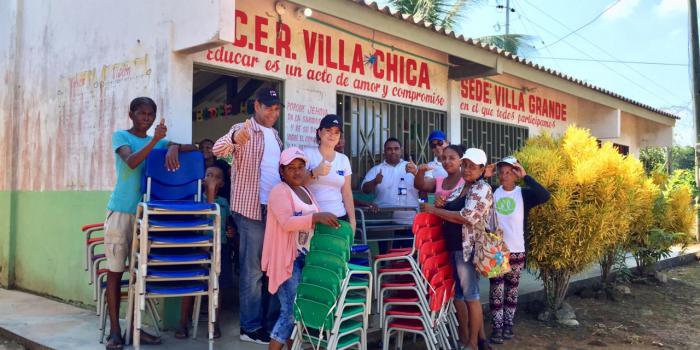
Afro communities of El Bagre are being rebuilt with collective reparation plan
Three community councils in this Antioquia municipality are overcoming the armed conflict with productive projects, endowments and the recovery of traditions thanks to the agreement between the Victims Unit and the World Bank.

With endowments for productive projects, financial compensation and recovery of traditions, the Afro-descendant communities of El Bagre (Antioquia) rebuild their ways of life in their territories, to which they returned after resisting the armed conflict and where a comprehensive plan for collective reparation is implemented.
The community councils of La Esperanza, Chaparrosa and Villagrande, of the Puerto López rural district, inhabited by about 250 people, now have better living conditions thanks to the equipment and supplies of clothing (flat and filleting machines, cutting tables, fabrics, threads), refrigerators and school supplies received by the Unit for the Comprehensive Care and Repair of Victims.
With these endowments acquired through the international cooperation model with the World Bank, with an investment of almost 74 million, projects such as dressmaking, which benefits women's groups, were strengthened.
One of them is Danilse Paternina, who highlighted "the opportunity we have to recover what we lost due to violence, and with this endowment, women entrepreneurs plan to set up a micro-company that helps to generate income for families".
In addition to these endowments, these communities also benefit from collective administrative compensation, which is invested in a trout farm that guarantees livelihood and economic independence.
Territory in recovery
Oiden Julio Vergara, representative of the Villagrande council, acknowledges that the collective reparation plan is advancing and "contributes to repairing, mitigating and compensating the damages caused by the conflict and the reconstruction of the social fabric that had been broken in our communities".
This leader recalled that between 1997 and 2005 "this territory was badly hit by the conflict with forced population displacement, massacres, selective assassinations, confinement and sexual violence".
Meanwhile, with the refrigeration equipment and the elements to reactivate the communications committee that they lacked, the community councils, distant between three and six hours per trail and on the back of a mule in the urban area of El Bagre, improved the physical spaces, community meetings, the exchange of knowledge and self-government actions. The recovery of traditions was also facilitated, such as the Afro gastronomic festival that they held again.
According to Wilson Córdoba, director of the Victims Unit in Antioquia, "this collective reparation plan recovers the social fabric, community practices and ancestral knowledge that were once interrupted by the armed conflict, in addition to strengthening Afro-Colombian identity through measures with an ethnic focus”.
Of the 55 collective reparation plans throughout the country that thanks to the agreement between the Unit and the World Bank developed community, productive and cultural projects in favor of 8,000 victims of conflict, nine are implemented in the Antioquia municipalities of El Bagre, Chigorodo, Apartadó, Cocorná, Turbo and Granada.
(End/JCM/LMY)






